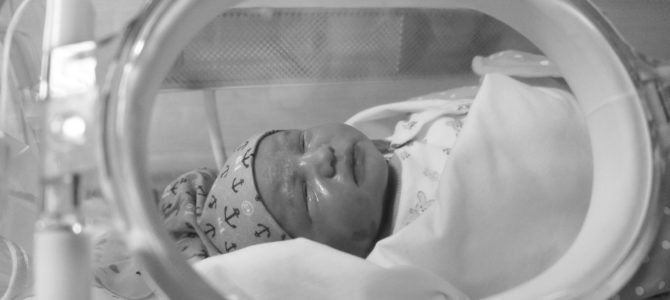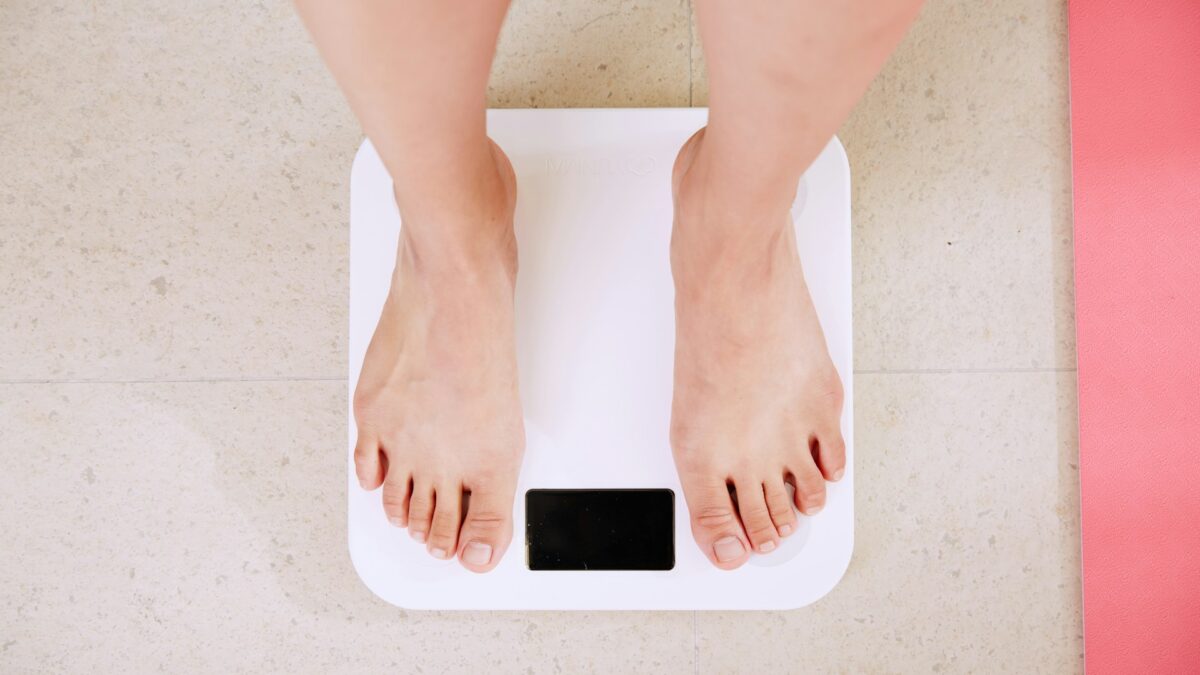
It was a perfectly healthy pregnancy, until it wasn’t. At 30 weeks and 5 days, two months to go until my due date, I was getting a sandwich at a deli across from work when my water broke. Initially in denial about what was happening, I told my husband not to come to the hospital. I’d let him know if it was serious.
Upon confirming I had a preterm rupture of the membranes, more commonly known as your water breaking before 37 weeks, doctors politely informed me that now would be a good time to call my husband. Indeed, it was serious. Our baby could come at any moment—far earlier than she should.
Premature rupture of the membranes is considered a “medical mystery” in the OBGYN world. Despite accounting for one-fourth to one-third of all preterm births, no doctor, researcher, or desperate Google search can explain why it occurs.
It was news to me that it’s possible to stay pregnant for days, if not weeks, once your water breaks. If my body could fend off going into active labor within the next 24 hours, doctors planned to put me on bed rest, where they would monitor closely for infections while the baby developed and I hopefully made it to 34 weeks. If my body allowed me to stay pregnant that long, the risk of infection (from the baby no longer protected by the amniotic sac) would outweigh the risks to the baby from delivering early—so doctors would induce.
No matter how long I made it, I was in for a stay at the Newborn Intensive Care Unit. Of course, I had heard of the NICU before, but I mostly thought it was reserved for serious surgeries and conditions that would never happen to me. Never did I imagine the NICU would be where my daughter would spend the first month and three days of her life.
“Expect the unexpected” was an understatement. The goal of 34 weeks turned out to be a stretch. At 31 weeks and 6 days, there was no stopping our little girl. I was in active labor and on September 12, Scarlett Payton made her entrance into the world.
What followed was a sea of emotions—some of the highest highs, and the lowest lows I might ever experience. In hopes of shedding light on this process and letting other NICU parents know they’re not alone, I’m sharing my most vivid reflections from our time there, and some things I wish I had known.
Every parent will walk away from the NICU with his or her own unique experience. When one in every 10 births in the United States are preterm, it’s long past time we start sharing them. Some NICU stays are far shorter than mine, while others are months longer. And tragically, not every NICU baby survives. The following observations are based on our experience, which will obviously differ from others’.
1. Will I Get to Hold My Baby?
This is an important question to consider asking doctors before giving birth preterm. If the answer is no, do what you can to emotionally prepare. This birth is probably far from what you imagined, and knowing doctors might rush your little one out the doors and into the NICU straight from delivery can save you from a lot of unknowns. It still won’t be easy, but at least you’ll be prepared.
At 31 weeks and 6 days, I was on the cusp of being able to hold my baby after birth. There was a chance she would come out crying and I’d get to hold her skin-to-skin, but doctors warned me they might have to whisk her away.
I ended up getting to hold her for a brief few seconds, before kissing Scarlett goodbye as she, my husband, and everyone but two nurses left the room. Being alone in a hospital right after giving birth left me in a strange purgatory between loneliness and overwhelming joy. I had a brand-new baby, but she wasn’t physically there. That was the first of many conflicting emotions I felt during our NICU stay.
2. Logistics Are Difficult
In most hospitals, NICUs are open rooms with no place for parents to stay overnight. On top of the emotional pain of having to leave the hospital without your baby every day, this leaves you with logistical questions. How do I get back and forth? How long each day should I stay?
To the former, I don’t have the answer. For me living in a city, it required lots of expensive Ubers, as I didn’t have the time or patience to deal with DC’s unreliable public transportation.
As to the latter, there’s also no one-size-fits-all answer for how long you should stay in the NICU each day, but it’s important to know that “kangaroo care,” (where you hold your baby skin-to-skin on your chest) is proven to have some incredible benefits, including positive brain development, weight gain, heart stabilization, and more. It’s also known to help mothers produce milk, and eventually assist in breastfeeding.
Because no one could tell me how long I should spend with my daughter in the NICU each day, I went as much as I could. For parents who are working or have other kids at home, this could mean going for a couple of hours a day. For me—a first-time mom with access to maternity leave—it meant I was spending at least eight hours a day there.
The chairs were uncomfortable (not easy to sit on after giving birth) and I often felt hungry or dehydrated (I was only allowed to bring in bottled water), but physically being there was important for bonding with my baby and helping her to gain the strength and skills she needed to eventually come home.
The amount of time I saw other parents spending at the NICU varied drastically. Some I hardly saw at all, while others were there for most of the day. Many fathers couldn’t come until after work.
3. Other People’s Stories Might Not Be Yours
Everyone knows someone who had a baby in the NICU. In some ways, the stories everyone will tell you are comforting. Quickly, you’ll realize you’re far from the first parent to have a baby in the NICU, and most babies who’ve been here turn out just fine. But you also have a right to experience the fears and anxieties of having a child in the NICU for yourself—all the stories you’ll hear (including mine) shouldn’t take away from that.
4. You’re Still A New Mom
With so many unknowns early on in Scarlett’s NICU stay, I took little comfort in hearing other peoples’ stories until I knew my baby would be okay. Most people know that having a baby in the NICU isn’t easy, but that won’t stop some (or in my case, me) from assuming that when you’re not at the hospital, you can be your same old self.
For me, this assumption was a huge mistake. I initially thought I could work part-time throughout my daughter’s NICU stay, without realizing how physically and emotionally demanding the process would be. Despite some of the best nurses and doctors in the world taking care of my baby, I was still a new mom and had a lot to learn.
On top of running back and forth to the hospital every day, I had to put together her nursery (which wasn’t ready at all!), pump every two to three hours to give her breastmilk, recover from giving birth, and somehow keep myself fed. The second I lowered expectations for myself and accepted that despite not having my baby at home I was still a new mom, I was better able to manage the various parts.
In the NICU, breastmilk is crucial to a baby’s development and can even save lives. Given the difficulty of pumping in a hospital and not having your baby always physically there, it is very common for NICU moms to not produce enough milk. Learn about donating unused breastmilk to NICU babies here. Moms like myself are more grateful than you could ever know.
5. Your Maternity Leave Schedule Will Be Off
Not everyone has access to a maternity leave, but if you do, it’s possible that you’ll be out of paid time off before your baby even leaves the NICU. If that’s the case, the pressure is on to start logging hours to avoid going without pay. But know: being a NICU mom might complicate that.
Premature babies require frequent, around-the-clock feedings until they reach full term (40 weeks). Once they reach full-term, that schedule will continue as if they’re a regular newborn. This means NICU moms get additional weeks of the frequent, nightly newborn feeds. Lucky us! Preemies also often take time to master the art of feeding.
When trying to figure out when I could begin working again, I didn’t factor in the extra weeks of demanding feedings. For better or for worse (I’d say for the better!), this meant taking more time off than I had originally planned. But financially, that can be difficult.
6. When Is Your Baby Coming Home?
Understandably, my husband and I were asked this question a lot. Doctors initially told us preemies typically get discharged within two weeks of their original due date—that could mean two weeks before it, or two weeks after.
To come home, NICU babies must reach four basic requirements: (1) they must weigh at least 4 pounds, (2) they must be able to maintain their body temperature in an open crib, (3) they must be able to feed on their own without a tube, and (4) they must not have any breathing or other “events.” Different babies will meet different combinations of these standards at different times, so doctors can’t predict when exactly each baby will be ready to go home.
I didn’t know when my daughter would come home until the day doctors told us she was discharged. At the time, it was clear she was doing well, but we were more than two weeks outside of her due date and didn’t want to get our hopes up. (Often in the NICU, it’s two steps forward, one step backwards.) So when doctors told us she could come home, we were surprised and hardly prepared.
While you’d think I’d be elated by the news, the prospect of leaving the nurses, doctors, monitors, and 24/7 care was enough to make me cry. My husband and I were officially on our own, and as excited as I was, I was also scared. After weeks in the NICU, you become reliant on the monitors and removing them makes you feel vulnerable again.
7. Look for the Silver Linings
While the NICU is tough, there are some pretty amazing upsides. Didn’t have a full-term baby? No one will believe that you just gave birth! And instead of being sent home with a newborn and having no idea what to do, you get training from the best doctors and nurses in the world.
If my husband and I were sent home with a full-term baby, we would have figured it out, like all parents do. But having doctors and nurses to answer our every question like whether we’re changing the diaper right was pretty nice. (Okay, we had more serious questions than that.) We were constantly learning and walked away with a wealth of insider parenting skills, such as swaddling a newborn in the bath. Our daughter loves it, and it’s something had it not been for the NICU, we would have never tried.
8. Mourn the Things You Lost
Instead of being hard on yourself for caring about the seemingly mundane things such as your birth plan going down the drain or your baby shower that got cancelled, allow yourself to be sad and mourn the things you lost.
Given the weight of the situation I was in, I felt feel silly for being sad about not being able to follow my birth plan or having time to decorate my nursery (which of course, eventually came together). But walking in and out of the maternity ward every day, I was surrounded by dozens of normal, full-term births. It’s hard not to compare.
With time, these feeling passed. Looking back, there’s no birth plan or baby shower in the world I’d trade for the extra snuggle time I got with my little girl.
9. Talk to Fellow NICU Moms
While your family and friends think you’re the one who has it rough, other NICU moms are sitting next to you who could have it worse. With some cases, it’s heartbreaking. With others, it’s inspiring. Either way, it’s hard to get down on your luck when surrounded by so many vulnerable little ones making miraculous advancements, and moms—some of whom are single or working two jobs—powering through.
When my daughter was in the NICU, I found out the mom next to me gave birth to twins who weighed less than two pounds. The boy passed away after six days in the NICU, while the girl—then two and a half pounds—was fighting on.
Ultimately, I learned that no one could understand what I was going through except a fellow NICU mom. Talking to them helped. At first it felt weird and invasive starting a conversation with the person sitting next to me, but by the time our daughter got discharged, I was hugging them goodbye and getting their phone numbers to stay in touch. We all got each other because we were all going through the same thing. NICU moms will always have a special bond.
10. Give Thanks
It’s scary to think about, but often I do: Had our baby been born 50 or 60 years ago, she might not have made it. But thanks to science, medicine, and modern American free-market health care, by 28 weeks, more than 90 percent of babies survive an early delivery. By 34 weeks, those chances increase to 99 percent.
Close to 32 weeks, we remained optimistic our little Scarlett would be just fine during her NICU stay and beyond. I’m happy to report that at the time of this article, she is home and doing well. While in the NICU it’s tempting to get down on your luck, you still have a beautiful baby, unlike so many women who would do anything to be a mom.
Looking back, I’m nothing but grateful for the extra time we got with our little girl. I call it our “bonus time,” because we weren’t supposed to have it. While I would never wish a NICU stay on anyone, I also wouldn’t trade our “bonus time” for the world. So long as your baby eventually makes it out, you—like me—have endless reasons to give thanks and be grateful.









